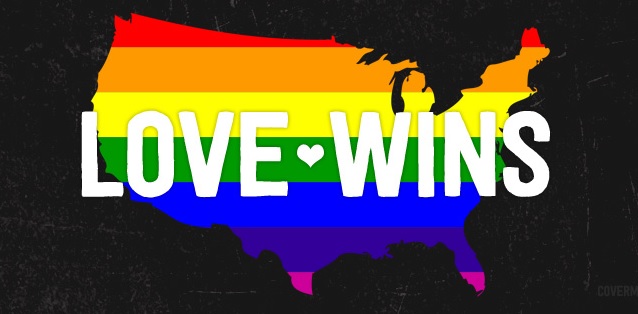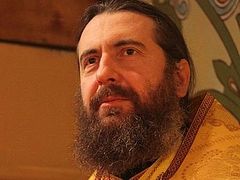
Times have been more trying than usual for supporters of marriage—that is, the institution that brings together a man and a woman and is fulfilled by the raising of any children that their union bears. Our new sovereigns, the Supreme Court—well, five of nine justices, at least—have thrown their legal weight squarely behind the sudden, seemingly unanimous commitment of our media and intellectual elites to the abolition of marriage.
This rebellion, like all rebellions, is a casting off of restraints. It is especially disappointing for those of us who understand that the family, the integrity of which depends upon such restraints, provides the foundation for the flourishing of individuals and communities. How can such goods be cast aside so carelessly?
For many of us who defend what I will call the anthropological view of marriage, the most troubling feature of the reigning confusion is the fact that so many friends and loved ones not only disagree with us, but find it impossible that any intelligent person—in this day and age, at least—would object to granting the “right” to “marry” to two people who “love” each other. Opposition must be rooted in irrational animus, and so a slogan has emerged: “Love wins.” What could be wrong with that?
The anthropological and the love-wins views talk past each other because one side is interested in human nature and its implications, in permanent features of the human condition as taught by both reason and revelation, and the other side—well, not so much.
The Two Views in Contest
The anthropological view is so called because it appeals to biological facts and to a closely associated social reality. Ryan Anderson lucidly lays out the argument for this view in a recent article:
For marriage policy to serve the common good it must reflect the truth that marriage unites a man and a woman as husband and wife so that children will have both a mother and a father. Marriage is based on the anthropological truth that men and woman are distinct and complementary, the biological fact that reproduction depends on a man and a woman, and the social reality that children deserve a mother and a father.
The government is not in the marriage business because it’s a sucker for adult romance. No, marriage isn’t just a private affair; marriage is a matter of public policy because marriage is society’s best way to ensure the well-being of children. State recognition of marriage acts as a powerful social norm that encourages men and women to commit to each other so they will take responsibility for any children that follow.
Redefining marriage to make a genderless institution fundamentally changes marriage: It makes the relationship more about the desires of adults than about the needs—or rights—of children. It teaches the lie that mothers and fathers are interchangeable.
In other words, marriage is an institution intelligible only by reference to enduring truths: Children are produced by the union of man and woman and flourish best with their biological parents. Marriage interests the state because the state cares about children. According to this anthropological view, the truth about marriage is fully responsive to, and therefore restrained by, truths about man. Apart from those truths, the institution doesn’t make sense.
Now, to be sure, no argument concerning human existence and the good life achieves the level of a mathematical demonstration. It’s unavoidable: No vision of the good life can be absolutely demonstrated to everyone’s satisfaction, but we still have to choose between the alternatives, and we should do so based on the quality of reasoning in the respective arguments. This argument for marriage, even if one disagrees with it, is reasonable and comprehensible. Supporters of the anthropological view would find slight but welcome consolation if the culture war’s current winners could bring themselves to acknowledge the existence of reasonable argument and evidence on the other side.
But the slogan “Love wins” bespeaks a definite triumphalism, rooted in the conviction that the opposing view has always been baseless. “Love wins”—that’s all there is to it. No nice and reasonable person would stand against “love.” Why oppose “progress,” unless you’re motivated by “bigotry”?
The love-wins view of marriage is not just about the love of same-sex couples, but also about the love (read: approval) of fellow citizens. To love, on this view, means always to accept another person’s own conception of his own good. The rainbow-faced advocate of pure and simple “love” enjoys at once the thrill of moral sincerity and the prestige of intellectual superiority. To count as a great lover of humankind, all I have to do is to let my neighbor do as he or she likes—and assure him that I respect his right to express himself as he likes. To impose any view of human nature would be to stand in the way of self-definition, and that’s bad. To be enlightened is to be on “the right side of history,” to show contempt for inherited moral structures insofar as they hold us back.
At the same time, from the anthropological point of view, the love-wins conception seems lighter than air, strangely oblivious to the human condition. The concentration on a wide-open “love” appears to be doubly seductive to persons grounded either in revealed law or in reason understood anthropologically. Revealed principles, history, and philosophy are all necessary to inform the concrete meaning of “love,” for a human being is a certain kind of being (a child of God, part of an orderly and lawful creation, a fallen creature with great potential for evil as well as good).
Truth, Love, and Freedom
In order to identify Christian charity with the “all you need is love” mentality, one’s warm emotions must be impeded neither by definite, non-negotiable religious covenant nor by belief in a permanent human nature. But from the anthropological point of view, to show love to a person requires respecting that person as he or she is. The content of love depends on truths of revelation and nature.
As with the love-wins view, this has implications for the citizen as well as the lover. For the anthropological view, love is not just about romance, nor is it about affirming others’ desires. It might require telling the loved one something he or she doesn’t want to hear—about consequences, or about repentance, for example.
The anthropological view accords moral and intellectual authority to an order seen as God’s creation. On this view, freedom or agency requires limits and consequences; freedom is not only limited by but informed by responsibility to eternal truth. Only moral agency (freedom limited and informed by covenants with God and by the structure of reality) is truly agency. Freedom is inseparable from the recognition of limits and consequences and, indeed, demands gratitude toward a moral order that we did not invent. While all actual political and social orders will fall far short of the eternal truth of moral agency in some respects (and should be held to account as far as possible), it is good to be subject to flawed but reasonable authority because we all need practice accepting limits on our freedom, bonds that make us free.
The love-wins view cannot even see the point of this authority, because it does not believe we need to pay any attention to “the laws of nature and Nature’s God.” We no longer need a guiding political philosophy or theology, for these concern only supposed permanent features of the human condition with their limits, constraints, and consequences.
There have been very learned and acute (if not wise) thinkers who argued that humanity’s natural limits could be overcome. Karl Marx envisioned a world beyond morality and politics that would combine absolute individual freedom with the perfect satisfaction of collective humanity. John Stuart Mill, the founding father of contemporary liberalism, imagined a similar outcome without the need for global class warfare to bring history to an end. John Dewey shaped our educational system on the basis of a new faith that the idea of a limited human nature was a prejudice we could leave behind. For Marx, Mill and Dewey, “human nature” was a fiction created by human history, and now human history can dispose of this fiction. We humans are masters of nature.
Our progressive believers in “love” are disciples of Marx and Mill and Dewey, whether they know it or not. They don’t need to know it because, living in a world in which the burdens of law and morality have become so light, it seems obvious that we can just do without them. Marx’s and Mill’s post-political philosophies are no longer necessary—we’ve already shirked human nature, even if we have not yet arrived at paradise. The whole anthropological argument is just so . . . “yesterday.” Isn’t it obvious that each generation, each decade—now, it even seems, each year—is freer than the one it has left behind? To believe in love is to believe in today.
The love-wins attitude is a post-anthropological attitude. And it finds this attitude, well, natural—even a matter of common sense and simple decency. If a publicly imposed sexual morality and family structure are “demeaning” to some people, then why not cast them off? What could the problem possibly be? What bad consequences could possibly follow from leaving behind antiquated restraints on the freedom of human love?
From the anthropological point of view, good people have to be made; from the love-wins point of view, people are good, except to the extent that they have been corrupted and prejudiced by tradition.
If human nature is a real given, then the intricate web of moral, social, and legal norms that on balance produces civilized human beings is a precious and fragile fabric that merits our deference. If human nature is a prejudice, then good people arise spontaneously, and there can be no harm in leaving them free to express themselves. Love means never questioning the free expression of the liberated inner self—as long as the self is not corrupted by traditional “phobias,” of course.
There is a large role for human intelligence in the “love wins” viewpoint, but this role is not to know enduring laws or limits governing the human condition. Rather it is to criticize these laws and limits—to remove them where they infringe upon desire. And there is a more positive role as well: While criticism frees us from traditional restraints, technocratic reason can attempt to conquer the consequences. If sex results in unwanted pregnancy, then contraception and abortion are ready at hand. If same-sex-oriented individuals wish to have all the same choices available to them as heterosexuals, then science can make babies for them on demand.
The Abolition of Man
From the anthropological point of view, there must be consequences to ignoring the human condition and its moral, social, and political implications. There is such a thing as the natural form and limits of the human condition, and nature will have its day, whether we believe in it or not. As Rudyard Kipling wrote:
As it will be in the future, it was at the birth of Man
There are only four things certain since Social Progress began.
That the Dog returns to his Vomit and the Sow returns to her Mire,
And the burnt Fool's bandaged finger goes wabbling back to the Fire;
And that after this is accomplished, and the brave new world begins
When all men are paid for existing and no man must pay for his sins,
As surely as Water will wet us, as surely as Fire will burn,
The Gods of the Copybook Headings with terror and slaughter return!
Indeed, are not Kipling’s “Gods of the Copybook Headings” already returning, and with a vengeance? As C.S. Lewis saw with great clarity more than seventy years ago, man’s mastery over nature—the abolition of nature—can only end in man’s mastery over mankind, “the abolition of man.”
So it seems to those with anthropological convictions that the effective truth of “love wins” is finally human power unchecked by God or nature. The authority of law and of the state, which, like Marx, we may imagine can wither away to nothing, can in reality only become more absolute in the absence of any higher authority. Absolute freedom from the traditional family can only mean the state’s power against the family.
Love wins. But love also bites.
Ralph Hancock teaches political philosophy at Brigham Young University and is President of the John Adams Center for the Study of Faith, Philosophy and Public Affairs. He is author of numerous reviews, articles and books on the intersection of reason, faith, and morality, including The Responsibility of Reason: Theory and Practice in a Liberal-Democratic Age.



